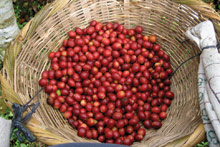Imagine that you’re on a coffee farm in Nicaragua. After pulping and rinsing the coffee “cherries,” the precious beans are dried, sold and shipped all around the world for roasting and brewing. It’s good, tasty stuff.

But what’s left over is nasty.
“We were thinking about that wastewater, which just goes to the ponds, and it’s a potential pollutant” that chokes the life out of streams, says Appalachian State University senior Susan Winston. Last summer, she was part of a student group working at Finca Esperanza Verde (Green Hope Farm) in Nicaragua, where they installed a solar hot-water system for the organic farm. Other ASU students and faculty involved in the project included Jeremy Ferrell, Jeff Ramsdell and Jack Martin.
The year before, another ASU group had set up a mechanical cherry-pulping system (previously, workers had to remove the cherries manually). The wastewater, however, is laden with pulp, sugar, mucilage, phosphates, nitrates and other organic chemicals, Winston explains.
“We wondered what to do with it,” she says. Villagers living below the farm had reported that the acidic brew was seeping out of the ponds and into their drinking and cooking water.
The students were supposed to be helping solve problems, not creating them, says Winston, who’s majoring in appropriate technology. As part of their summer project, they interviewed villagers to find out what their needs were and what potential solutions would be the best fit with their culture, existing infrastructure and resources. Besides good water, the students learned, the villagers needed an alternative to cooking with firewood—which creates pollution and isn’t a sustainable source, Winston points out.
So the students came up with what they call “fair-trade ethanol”: “Sugar-rich water could be good for making ethanol” that could then be used for a number of purposes, including cooking, she notes.
Taking the end product of one process and using it to start another is a key concept in industrial ecology, a field that’s been around since the 1970s, ASU professor Kristan Cockerill explains. The idea began catching on after two General Motors executives, Robert Frosch and Nicholas Gallopoulos, wrote an article in Scientific American 30 years ago. “This industrial ecology,” they wrote, “would close the loops left open in conventional industrial processes. It would virtually eliminate irreversible flows of virgin materials into pollutants, transforming them into flows complementary to nature’s own [by turning] waste into a resource.”
In other words, it’s about imitating natural processes.
Cockerill got involved in the wastewater project because one of her students—who has since graduated—helped prepare a proposal for a $10,000 grant from the U.S. Environmental Protection Agency’s People, Prosperity and the Planet program. “The students’ idea cleans up the water supply and provides energy for other uses,” she says.
ASU was recently awarded the P3 grant to fund a phase-one feasibility study. “We know you can compost coffee [grounds]; there may be enough energy in [the wastewater] to create biofuel. Theoretically, it makes sense,” says Cockerill.
Only 24 universities earned P3 grants this year, and ASU has two of them (the other one involves studying algae as a biofuel source, says Winston).
For the ethanol project, Winston’s student group will return to Finca Esperanza this January to assess the wastewater’s sugar content, perform other tests and ship a load of coffee cherries back home for further study.
By some measures, coffee is the second-most-traded commodity in the world (after petroleum), but it’s not always profitable for locals in the poorer parts of the world where it grows, and it’s often not grown sustainably, Winston points out. At Esperanza, however, the approach taken to producing that valuable crop is part of a much larger, more complex, mutually beneficial ecology. Owned by a Durham, N.C.-based nonprofit—Sister Communities of San Ramón, Nicaragua—the farm is run by Nicaraguans. It includes a nature preserve, an eco-lodge and a butterfly farm. The coffee itself is shade-grown and certified fair-trade, and it’s bought by another Durham-based entity, Counter Culture Coffee. “It’s such a multipurpose project,” notes Winston, “dealing with human health, economics, the environment.”
If the feasibility study passes muster at a competition in Washington, D.C., in April, she explains, ASU could win a phase-two grant—$75,000 to take the wastewater idea and “actually do it.”
But in any case, the project has already had at least one more immediate impact: Since her trip to Esperanza, notes Winston, “I started drinking more coffee.”
For more information about this year’s P3 grants, visit the EPA Web site: http://es.epa.gov/ncer/p3/current/index.html.
Send your environmental news to mvwilliams@mountainx.com, or leave a message at 251-1333, ext. 152.



Before you comment
The comments section is here to provide a platform for civil dialogue on the issues we face together as a local community. Xpress is committed to offering this platform for all voices, but when the tone of the discussion gets nasty or strays off topic, we believe many people choose not to participate. Xpress editors are determined to moderate comments to ensure a constructive interchange is maintained. All comments judged not to be in keeping with the spirit of civil discourse will be removed and repeat violators will be banned. See here for our terms of service. Thank you for being part of this effort to promote respectful discussion.